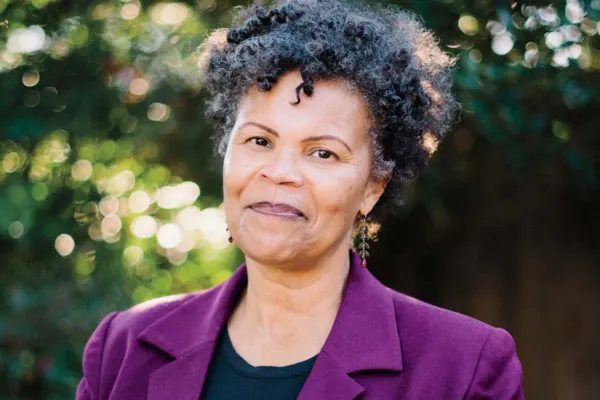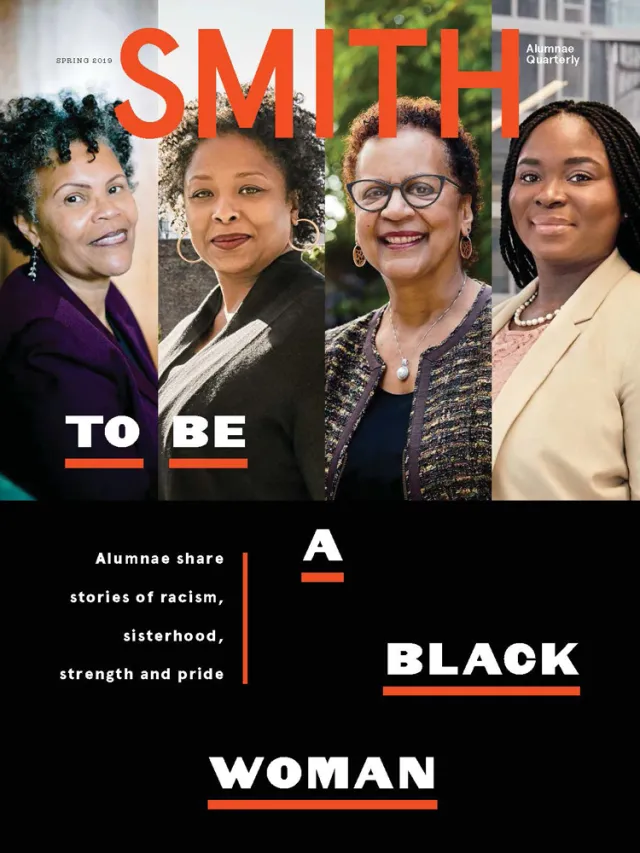‘Who Came To Soothe My Soul? All My Black Sisters’
Alum News

Published March 13, 2019
Strawberry blond, blue-eyed, red-lipsticked, smiling, the sun in her eyes, a white woman led me to Smith College. Yes—“Out-of-the-ash-I-rise-with-my-red-hair-And-I-eat-men-like-air”—Sylvia Plath ’55.
In 10th-grade English class, I’d read her woefully electric memoir, The Bell Jar. Unabashedly bitter, she bitched: Oh, to be female in a male-suffocated world.
I was stricken. As improbable as it may seem, I, a girl growing up Afro and American in a housing project on the east side of Cleveland, connected to that voice. “Every woman is a whore,” she wrote. And that’s how me and my sister felt being sexually assaulted every week in the pissy hallway while trying to get to our apartment. Forced whoredom.
Sivvy Plath and I were worlds apart in class and culture. Yet the common core of our experience was the same: male abuse. And our weapon was the same: a pen powered by passion, poetry, incisive writing that penetrated like a pair of surgical scissors.
I went to bed dreaming of Smith College, gracious living and literature. I would become a piercing writer like Sivvy, a mistress of metaphor: “An elephant, a ponderous house.”
Instead, upon entering the Grécourt Gates, I encountered white girls whose privileged chirping and alienating blue-eyed stares annoyed me to my core. What do you call those? Corn rows? The onus always on me to explain my culture, my being. Would Sivvy have looked at me that way? I was disappointed, but unfazed. As a scholarship student at a prep school, I’d heard it all before.
But when my Beowulf professor—a newish fellow—insisted I needed a remedial writing course, I was fazed. Downright insulted. An obedient student, I did as told. After I penned only two essays, the professor, a woman this time, informed me I had no business in her class. My writing far exceeded that of most students, she assured me. My grade was A.
My 20th-century-novel class posed challenges as well. George Orwell’s Coming Up for Air and Thomas Mann’s Magic Mountain—who can ever forget the temptress Clavdia Chauchat?—intrigued. Still, it pained that my insightful professor seemed oblivious to the genius of African American novelist Toni Morrison. I mustered my courage and confronted him: “Don’t you know The Song of Solomon—‘O, Sugarman done fly away’—is arguably one of the greatest novels of all time?” Seven years after I graduated, Morrison won the 1988 Pulitzer Prize for Beloved, and, ultimately, the 1993 Nobel Prize for Literature. I was vindicated.
Who came to rescue and soothe my soul after these unnerving clashes?
All my black sisters with their sassy, sizzling intellect, creativity and daring. Robina Gumbs ’82, prelaw, poised, sharp as a tack. Charlene Cassimire ’81, theatre, dance and acting. Ellen Chesley ’81, government and economics, a skilled no-nonsense debater at Thursday-evening dining. Beverly Dancy ’81, psychology, providing witty civic analysis of Brooklyn, New York. Dana Wise ’80, prelaw and Buddhist, chanting her strange mantra every morning like Queequeg. Phyllis Winfield ’81, religion, immersed in a yearlong marathon to read the entire unabridged Merriam-Webster dictionary.
Just as a white woman beckoned me to Smith, another gave me my final send-off as a writer. I remember that night like it was yesterday: dinner at the President’s House, the light-blue Queen Anne sofa, her sparkling Outback-blue eyes. “And what will your voice be?” Jill Ker Conway asked. I’d always liked her grit, the sand in her soul, The Road from Coorain. Inside I shuddered, no idea how to answer.
Voice.
It’s taken a lifetime to realize that Sivvy, Robina, Charlene, Ellen, Beverly, Dana, Phyllis, Jill and so many others—black, white, Asian, Middle Eastern—gave me voice. Their in-your-face smarts and academic audacity inspired and urged me on to the three literary prizes I won senior year and beyond. Each, in her own way, gave me identity, perspective, power and words to speak and be heard as a Smith woman of color in the world.
Writer and editor Charlise Lyles ’81 wrote the memoir “Do I Dare Disturb the Universe?”: From the Projects to Prep School.
This story appears in the Spring 2019 issue of the Smith Alumnae Quarterly.

To Be a Black Woman: Alumnae Share Stories of Racism, Sisterhood, Strength and Pride
Deborah Archer ’93, “I’ve Picked a Lane. It’s Racial Justice.”
Billy Dean Thomas ’14, “I Felt Like I Was Being Tokenized”
Caroline Clark ’85, “I Am Not Black or a Woman. I’m a Black Woman”
Lori Tharps ’94, “I Yearned for a Comfort and Confidence in My Blackness”
April Simpson ’06, “If we listen to how others define us, we remain stuck” Q&A with Sandra Williams ’75, senior vice president at CBS Television
Deanna Dixon ’88, “I’m Proud That Our Students Hold Us Accountable”
Joyce Young ’75, “Challenging the Status Quo by Writing My Truth”
“What Excites You, Gives You Joy, Gives You Hope About Black Women in the World Right Now?
Sabine Jean ’11, “Am I the Only Black Person in Here?”
Vickie Shannon ’79, “Racism Is Their Problem—Not Yours”
Stephanie Mickle ’94, “Black Women Can Rally Voters, Influence Elections and Win”
Photo: Brandon Thibodeaux